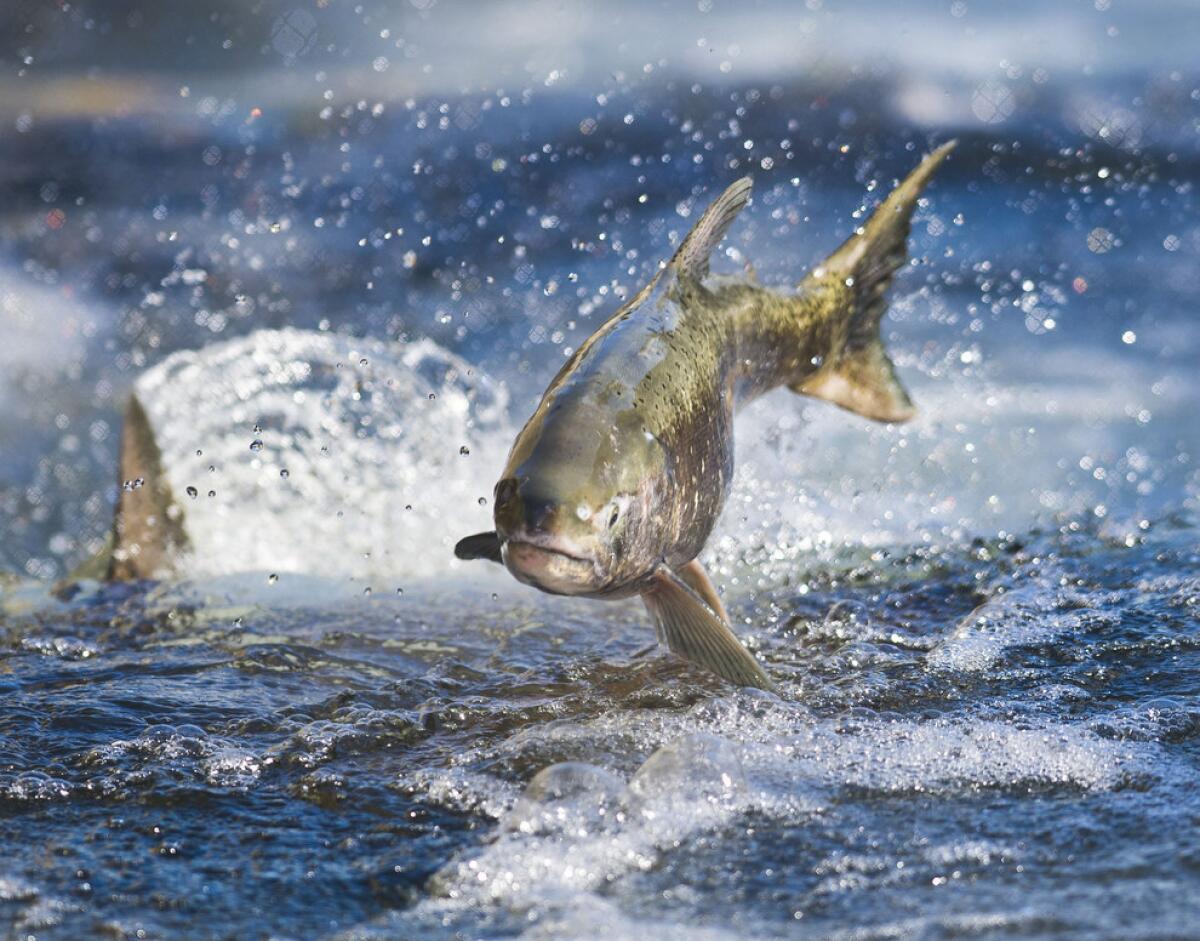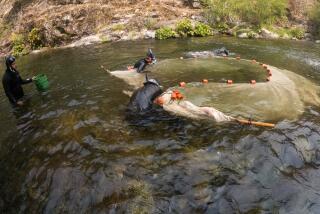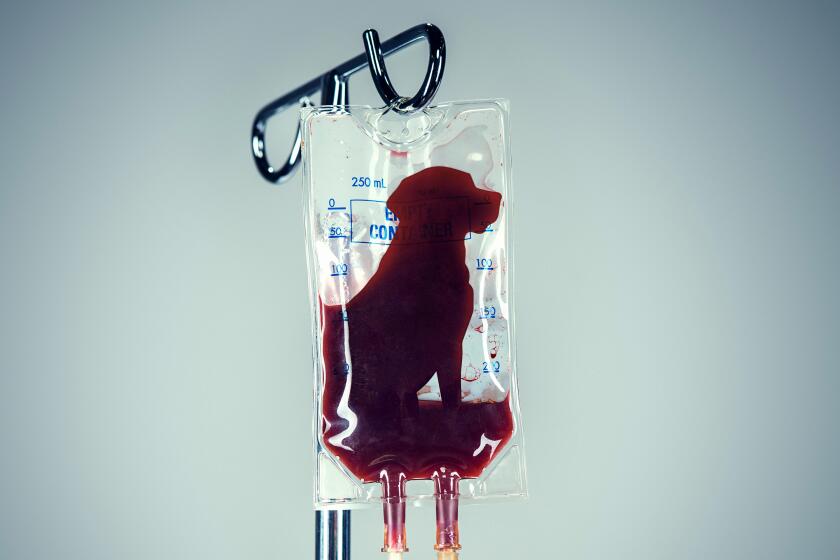A report shows Trump’s water plan would hurt California salmon. The government hid it

Federal officials suppressed a lengthy environmental document that details how one of California’s unique salmon runs would be imperiled by Trump administration plans to deliver more water to Central Valley farms.
The July 1 assessment, obtained by The Times, outlines how proposed changes in government water operations would harm several species protected by the Endangered Species Act, including perilously low populations of winter-run salmon, as well as steelhead trout and killer whales, which feed on salmon.
But the 1,123-page document was never released.
Two days after federal scientists submitted their review, called a biological opinion, a regional fisheries official pulled the document and replaced the team that wrote it with a new group tasked with revising it, as The Times reported in July.
Had the opinion been adopted and released, it would have interfered with efforts to ramp up irrigation deliveries to powerful California farm interests with ties to the Trump administration. The revision, critics say, is another example of the administration intervening to weaken environmental protections and reverse the findings of federal scientists.
This report by the National Marine Fisheries Service concluded that planned water diversions by the Trump administration could imperil winter-run salmon, and other species in California. The report was never released.
In the report, the National Marine Fisheries Service unequivocally concludes that increasing water deliveries would likely jeopardize the continued existence of endangered winter-run Chinook salmon, threatened spring-run Chinook and threatened Central Valley steelhead, as well as endangered Southern Resident killer whales that dine on salmon.
The proposed changes in California water operations “will produce multiple stressors” on winter-run salmon “that are expected to reduce survival and the overall fitness of individuals,” the agency wrote.
Harmful impacts include warm river temperatures lethal to fish eggs and newly hatched salmon; low flows in the Sacramento River and more salmon deaths at the giant government pumps that send supplies south from the Sacramento-San Joaquin Delta.
“Winter-run Chinook salmon are particularly important among California’s salmon runs because they exhibit a life-history strategy found nowhere else in the world,” the scientists noted.
Adults leave the ocean and migrate upstream in the winter and early spring. During the summer, they historically spawned in cold, spring-fed rivers and streams in Northern California. But the fish lost access to those spawning grounds after the federal government constructed Shasta and Keswick dams on the upper Sacramento River in the 1940s.
That, coupled with the destruction of flood plains and other habitat, sent the fabled run on a long downward spiral. Now only a few thousand of them typically return to California every year to swim upstream to spawn below Keswick, which regulates flows out of Shasta.
Despite spending millions of dollars on hatchery operations, fish screens and gravel bed restoration, federal water managers have fallen far short of meeting a long-standing congressional goal of doubling the natural production of anadromous fish in Central Valley rivers and streams.
Of over 165 species that the marine fisheries agency protects under the Endangered Species Act, California’s winter-run Chinook “is considered one of just nine species that are most at risk of extinction in the near future,” the agency wrote.
The extinction risk has increased since 2007, in part because warm-water releases from Shasta during the state’s severe drought cooked salmon eggs and newly hatched fish. In 2015, 96% of the eggs and fry died.
Revision of the July 1 biological opinion is “unquestionably an effort to subvert the best available science,” said Noah Oppenheim, executive director of the Pacific Coast Federation of Fishermen’s Associations, which represents commercial fishermen.
“Literally before our eyes, we’re seeing science suppressed by monied political interests,” he argued.
Paul Souza, the regional U.S. Fish and Wildlife director who is coordinating work on the salmon opinion and a separate one for delta smelt that his agency is conducting, rejected claims that the July 1 assessment was suppressed. It was a draft that needed more work, he said.
“We have no final documents yet,” he said. “I know there are a lot of conversations about politics. But that’s a misunderstanding of the fact. We’re working with career professionals, scientists and leaders in Sacramento and making sure we do everything in our power to conserve the fisheries that we care deeply about and also meet water supply needs.”
Souza said the U.S. Bureau of Reclamation, which runs the Shasta operations, has agreed to maintain higher May 1 levels of the reservoir, increasing cold water reserves for salmon. The bureau will also adhere to what Souza called “smarter” delta pumping restrictions based on the real-time location of fish.
One of the biggest beneficiaries of the Trump proposal to increase water deliveries is the Westlands Water District, a sprawling irrigation district on the arid west side of the San Joaquin Valley led by some of the state’s wealthiest growers. In 2018, the district’s biggest crops were almonds, pistachios, canning tomatoes and cotton.
Westlands and other districts that depend on water supplies from the delta have bitterly fought Endangered Species Act restrictions for delta smelt and migrating salmon that have restricted their deliveries.
Water users argue that fishery agencies pay too much attention to fresh water flows in the delta and the rivers that empty into it — and too little attention to other environmental stressors, such as exotic predators, that have contributed to the fish crisis.
Critics of the act now have a major ally, Interior Secretary David Bernhardt. Before joining the Trump administration, Bernhardt was a partner in Brownstein Hyatt Farber Schreck, a top-grossing law and lobbying firm that sued Interior four times on behalf of Westlands. Bernhardt was a lobbyist for Westlands and personally argued an appeals case challenging salmon protections.
He is leading efforts to implement a 2018 Trump administration directive to develop plans for “maximizing water supply deliveries” from the federal Central Valley Project, which operates Shasta Dam and reservoir and sends irrigation water to Westlands.
Releases from Shasta Lake, California’s largest reservoir, are not only vital to CVP deliveries to the state’s agrarian middle, they are critical to maintaining river flows and cool water temperatures for fish.
That conflict is a focus of the July 1 biological opinion, which found that under the Bureau of Reclamation’s proposed water operations, salmon would lose needed reserves of cold water, as well as flows to sustain important floodplain habitat.
“Each freshwater life stage will be harmed to some degree by the [proposal], with extensive lethal impacts expected to eggs, fry, and juveniles,” scientists concluded.
If the new team delivers a less critical assessment of the Trump proposal, it will not be the first agency reversal on California fish protections.
In 2004, under the George W. Bush administration, federal biologists concluded in draft documents leaked to the media that delta water operations would jeopardize populations of winter-run Chinook and Central Valley steelhead. A few months later, a final opinion reversed that finding, opening the door to increased exports.
The Commerce Department inspector general later faulted the fisheries service for not following agency guidelines designed to ensure “the quality of the biological opinion.” A series of lawsuits followed, ultimately resulting in tougher protections for delta smelt and salmon — which the Trump administration now seeks to undo.







